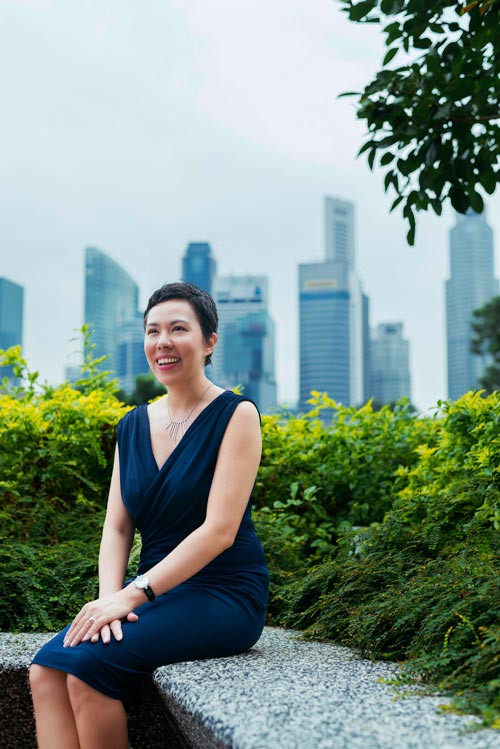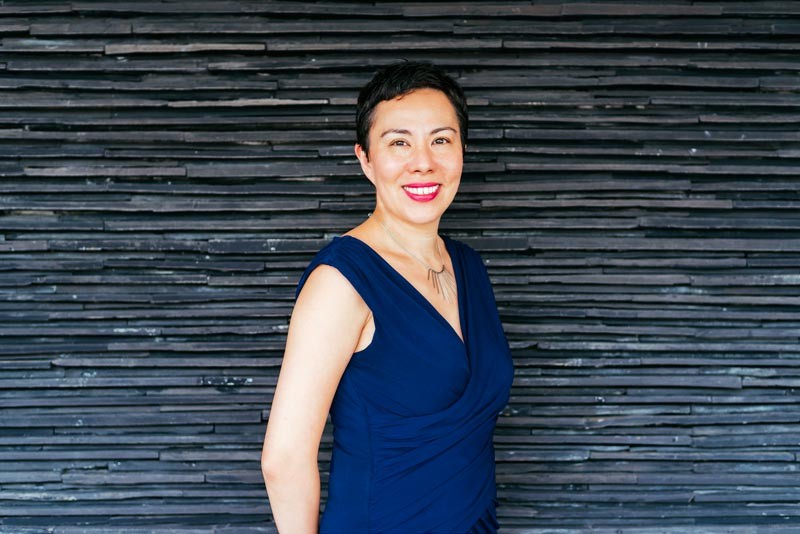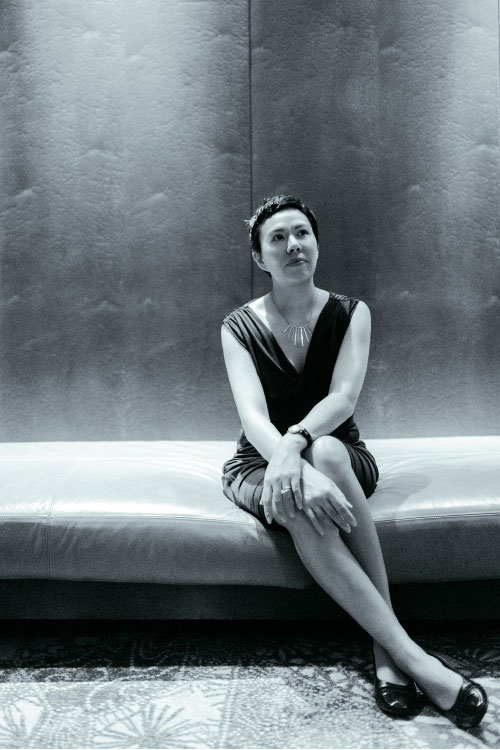Away in a niche, Gina Romero is caught in a lively conversation with a group of sleek fillies from The Athena Network, chatting amicably as if they are regular Sunday brunch besties. I admire her vivacity from afar—she is clearly in her own element, doing what she loves. I approach Gina in a quiet, unspoken way, and she immediately senses that I’m her two o'clock appointment. “Let me apologise to you first—I am really awkward on camera,” she says, sotto voce, while politely maintaining eye contact. I assure her she has nothing to worry about and we settle into a corner table at Mandarin Oriental’s Axis Bar and Lounge, tuning out the background murmurs. It’s too easy to assume that Gina’s idea of connecting women consists of frequent well-intentioned meet-ups and the exchange of business cards. But she quickly shatters assumptions, as I find a deep altruism that is perhaps cultivated out of extreme life experiences. “People think I am a generous connector, but at the end of the day, I just like solving problems. If you come to me with a problem, I will think of ways or someone who might be able to help.” Gina has an inimitable personality. She is self-effacing, and yet possesses a unique resilience when her beliefs are tested in a world where money is the currency of business. “People constantly ask me why I am not monetising more effectively,” admits Gina. Her lips purse slightly off-center. “For example, why am I not charging more for The Athena Network membership fees or events? I don’t want to make money from events because they serve as a platform to build the community. Personally, monetising a community is not right.” This nothing-to-prove confidence can be mistaken for a lack of aggressiveness or business acumen, but underneath the veneer, the power of influence is what she truly values. When I ask Gina about her thoughts on social entrepreneurship, she recalls a Damascene moment. “I didn’t know anything about social entrepreneurship until Grace [Sai] spoke at an event of mine—something inside just clicked and I suddenly felt like I knew who I was.” She then goes on to state the definition: “Social entrepreneurship is not about charity or giving back. It’s about creating something that is commercially viable and profitable, with a deep meaningful impact.” Something inside of me believed her; because there are moments in life when a person or stranger can become your luminous point of clarity.
A Revealing Conversation with Gina Romero
WY-LENE YAP: I saw on your LinkedIn profile that you are involved in many communities and projects, and they centre around one common theme: women. Do you consider yourself a feminist?
GINA ROMERO: I see myself more as an entrepreneur than a feminist. You know what, I didn’t know the concept of feminism until the last couple of years—I wasn’t brought up in an environment where it was a thing. The notion was completely off my radar for the most part of my life. My life has been kinda strange. The Athena Network was accidental and it was my first foray into the women’s space—I was invited to attend an event organised by them and became heavily involved in it.
WY-LENE: Sometimes you just stumble into something that works.
GINA: Yeah, that happens a lot in my life. Everything that I’ve done has been a series of events. On one hand, I have been willing to roll with it, but on the other hand, there is a side to me that is very deliberate—and I don’t think people see that. They think I am very energetic, fun-loving and laidback…
WY-LENE: There are many sides to a person.
GINA: Looking back, I realised that I have stuck to my path. Sometimes I read my past interviews and I can’t believe I was harping on about a particular topic.
WY-LENE: You have evolved.
GINA: I have been through a lot of changes. I don’t know if you are aware of my background.
WY-LENE: You ran away from home when you were younger… you have a background in IT… your family business was blown up by a volcano… you came to Singapore in 2010…
GINA: Wow, you have been stalking me. [laughs] The only constant thing is I had to be very adaptable. I have been on both ends of the economic spectrum. Growing up, I lived in very wealthy homes because my parents were domestic helpers for extremely rich families, and I was exposed to so much money and success. Although I went to the top boarding schools in the UK, I was probably the poorest kid out of all my classmates. Ironically, when I went to the Philippines thereafter, I became the richest person. So when you go from one extreme to the other, it really changes the way you see things.
WY-LENE: Tell me more about The Athena Network.
GINA: The Athena Network is a platform to meet other businesswomen and we focus on networking in a more collaborative way. Back then, when I first joined The Athena Network in the UK, I was amazed to find all these businesswomen who were doing different things and coming together to share their experiences. The concept never crossed my mind, but it turned out to be an amazing support for me. So when I came to Singapore, I decided to start the exact same thing here, with encouragement from the Singapore Council of Women’s Organisation [SCWO]. Here’s the funny thing: In the UK, nobody really cared much about it. But in Singapore, all of a sudden, it looked like I was doing something really amazing that people hadn’t heard of before and I was thrown into the limelight unexpectedly.
WY-LENE: You’re also a big advocate of technology.
GINA: After I started The Athena Network, I helped SCWO set up their social media account because they didn’t know how to go about doing it. Thereafter, SCWO introduced me to Google because they wanted a community partner, so we worked with them for 6 months. That solidified in my head the lack of adoption of technology by small businesses. Furthermore, I noticed that a lot of women who leave the corporate world don’t know how to set up their IT systems like email addresses, servers, SCRM, etc... So last year, I created Executive Lifestyle to help companies amplify their brand message through community marketing, content, media co-creation, advertising and PR. To get the platform up, I have been hiring women from the Philippines who work from home, and they have been great support in terms of content and business growth. The interesting thing is people keep asking me: “Where do you find such talent? I need someone. Can you help me?” And it occurred to me that I could also build a training centre that helps employers find the right talent because there is a huge pool of resources in the Philippines.
WY-LENE: There is a lot of competition in the women’s space right now with the likes of CRIB and LadyBoss. What are your thoughts on that?
GINA: I have been sweating over it since last Christmas—especially LadyBoss, because Jackie [Yeo] just came out of the blue and she has been driving her platform aggressively. But I realised that if I was getting nervous about good competition, then I am not thinking big enough.
WY-LENE: Competition is good, as it pushes you to think more critically of your value and the kind of impact you want to achieve.
GINA: Yeah, I absolutely agree. I even said to The Athena Network members: Imagine if you were a soldier in a war, and another soldier from a different camp showed up on your side, would you reject him or her? You wouldn’t, right?
WY-LENE: So what is your revenue strategy?
GINA: I’ve yet to find the optimal balance between maximising revenue potential and positive social impact. I have had revenue opportunities like sponsorship but I have been turning them down because I didn’t think the fit was right. For The Athena Network, we have a good model, but to be even more commercial, we probably have to scale across APAC. And I am not the right person for that job. I love to drive the community aspect rather than the strategic growth.
WY-LENE: What is the most important networking skill one should possess? Are you going to say: It’s not what you know, it’s who you know?
GINA: The whole concept of networking is seriously misunderstood. People think it is how you present yourself at events… what kind of questions you ask… those are just the technical parts. Ultimately, every single amazing connection or opportunity I’ve had, was from someone whom I have helped before with completely no agenda.
WY-LENE: When you want to truly help someone, you shouldn’t expect anything in return.
GINA: At the end of the day, I just like solving problems. If you come to me with a problem, I will think of ways or someone who might be able to help.
Influence is my superpower.
WY-LENE: What do you seek most out of life then?
GINA: To be honest, I definitely seek out influence more than anything else because influence is my superpower. And I use it in situations where I can make a difference and drive change. There are many people who do good but it’s small in terms of impact, and they don’t get any coverage or traction.
WY-LENE: Who is your favourite superhero?
GINA: I think everybody has a superhero version of themselves. So if I were to conceptualise how I would look like, I would be Spiderman but instead of shooting webs, mine would be Wi-Fi.
WY-LENE: Or you could be the web of influence. 🙂
GINA: Oh, I like that better than mine!
WY-LENE: Tell me about a time you were faced with insurmountable odds, yet persevered to overcome.
GINA: I am not the kind of person who stands at the bottom of a mountain, looks up, and says: ‘I am not able to climb that.’ I just do it and all of a sudden, I am at the top of the mountain.
WY-LENE: Other than deciding to work for yourself, what was the single most important decision you made that contributed to your success?
GINA: I don’t have any regrets in life even though I’ve made some serious and expensive mistakes before. I could have made millions if I had done it right at the time… but I didn’t. And to be honest, I am kinda okay with it because what matters more is learning from your mistakes and what you do after that. At the end of the day, I don’t take myself too seriously. I always tell people: it is pointless to have guilt and regret. At this particular moment in your life, you do what you do because it feels right, and you make the best decision based on the situation. How do you know what the outcome will be? The only person who has clarity whether the decision is right or wrong is you. In that moment, it is always the right decision because instinctively, that’s how we survive.
Sometimes people ask me if I will be their mentor and the first thing I do is to get them to mentor someone else.
WY-LENE: What have you learned about leadership, entrepreneurship and mentoring others?
GINA: Well, it’s a lot flatter than it seems. People look at someone who is successful and has more experience to be their mentor. But is the person a true leader? Sometimes people ask me if I will be their mentor and the first thing I do is to get them to mentor someone else. Instead of finding one, be one—because that’s the best way to approach mentorship and you get so much more out of the entire experience.
WY-LENE: Women’s entrepreneurship has hit a media tipping point. The real question is: Is it just a passing media fad, or is it actually a real, fundamental economic force that’s reshaping the world?
GINA: We are going to see a tremendous amount of change and disruption because of the access to connectivity. My personal assistant just got internet connectivity in her town, and she runs the backend of The Athena Network from home. To me, I see her as an entrepreneur because entrepreneurship is about taking initiatives, risks, as well as being enterprising and resourceful. So with connectivity now reaching pockets of talent everywhere, women can build a global dream from their kitchen table.
If you are not a dominant person, don’t try to be a dominant leader just because successful male leaders display that characteristic.
WY-LENE: Do you think it’s harder for women to command the same level of respect as compared to their male peers?
GINA: I don’t think the path to gaining respect is the same. They way women naturally lead and work is different. It doesn’t matter what your skills are—play to your strengths. If you are not a dominant person, don’t try to be a dominant leader just because successful male leaders display that characteristic.
WY-LENE: What is something you believe that nearly no one agrees with you on?
GINA: People constantly ask me why I am not monetising more effectively. For example, why am I not charging more for The Athena Network membership fees or events? I don’t want to make money from events because they serve as a platform to build the community. Personally, monetising a community is not right, so I have to find other revenue streams. Many people just look at the obvious opportunities and think I am not interested in the money or I’m not savvy enough… but the truth is, I think they underestimate what I have up my sleeve.
WY-LENE: What is your most marked characteristic?
GINA: I’m a very deliberate person.
WY-LENE: What is the trait you most deplore in yourself?
GINA: My delusional optimism.
WY-LENE: What do you consider the most overrated virtue?
GINA: Generosity. Sometimes you could be giving in a way that feeds the problem.
WY-LENE: What is your greatest fear?
GINA: There are times when I fear success more than anything else because I do worry if I might lose myself in the process. What if I become someone different?
WY-LENE: What do you regard as the lowest depth of misery?
GINA: I have been through quite a lot of ups and downs in my life. For example, when I was three months pregnant with my son, my first husband had a serious car accident and suffered a severe brain damage. Although he survived, he had mental problems, and my marriage broke down at the age of 25. That being said, I was the most miserable when I first came to Singapore because I had completely lost my identity. The perception of privilege is completely misunderstood. Initially, I was excited because I wasn’t going to work and be a stay-at-home mum… I had a pool, a helper, etc. On paper, I thought my life was going to be amazing, and all of sudden, I felt so disempowered and I didn’t know what to do with myself. So I started looking for jobs but I couldn’t apply for them as I didn’t have a degree. In order to pass time, I ended up watching Desperate Housewives when my husband went to work, but deep down, I was miserable.
WY-LENE: You lost your purpose too.
GINA: Yeah, but I shouldn’t be miserable or complain when I have everything…
WY-LENE: Do you have a secret hunch about how you will die?
GINA: Oh my god, this is my favourite question! I will probably have a very unglamorous death. I have never really injured myself before, but there was this one time when a whiteboard fell on my head and I had two slipped discs in my neck. It was the most embarrassing injury ever. So my death would be something like: She slipped on a marker pen and it spiked her heart. I am going to write a note in my will that says: If I die in an embarrassingly uncool way, just make something up. [laughs]




